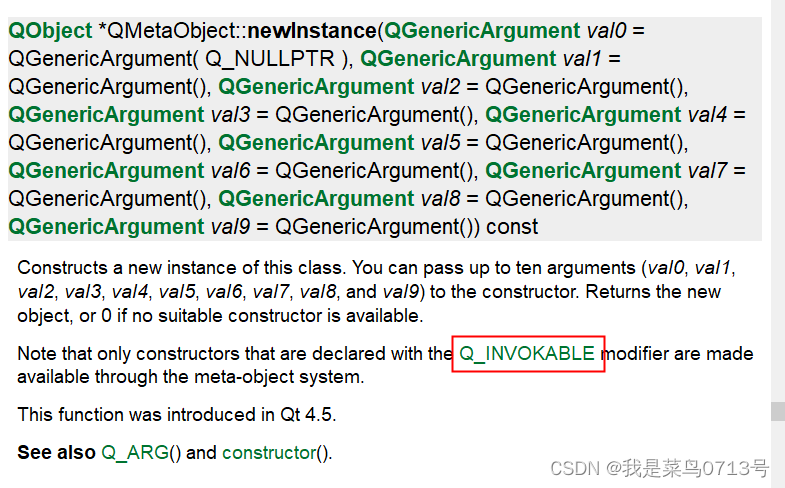-
Qt通过QMetaObject创建实例
myclass.h
#ifndef MYCLASS_H #define MYCLASS_H #includeclass MyClass:public QObject { Q_OBJECT public: Q_INVOKABLE explicit MyClass(QObject *parent = nullptr); Q_INVOKABLE void myMethod(); }; #endif // MYCLASS_H - 1
- 2
- 3
- 4
- 5
- 6
- 7
- 8
- 9
- 10
- 11
- 12
- 13
- 14
myclass.cpp
#include "myclass.h" #includeMyClass::MyClass(QObject *parent) :QObject(parent) { } void MyClass::myMethod() { qDebug() << "Hello, world!"; } - 1
- 2
- 3
- 4
- 5
- 6
- 7
- 8
- 9
- 10
- 11
- 12
- 13
main.cpp
#include#include #include #include #include #include #include "myclass.h" int main(int argc, char *argv[]) { QCoreApplication a(argc, argv); const QMetaObject metaObject = MyClass::staticMetaObject; QObject *myObject = metaObject.newInstance(Q_ARG(QObject*, nullptr)); // QMetaObject::invokeMethod(myObject, "myMethod"); qDebug()<<"hello world"; qDebug()<<myObject; qDebug()<<"hello world"; QMetaObject::invokeMethod(myObject, "myMethod"); return a.exec(); } - 1
- 2
- 3
- 4
- 5
- 6
- 7
- 8
- 9
- 10
- 11
- 12
- 13
- 14
- 15
- 16
- 17
- 18
- 19
- 20
- 21
- 22
- 23
重点在构造函数声明
Q_INVOKABLE explicit MyClass(QObject *parent = nullptr)- 1
实现:
MyClass::MyClass(QObject *parent) :QObject(parent)- 1
要不然返回的myObject就为nullptr。看了百度上的好多回答都是错的,也是看了Qt官方文档才知道的。

-
相关阅读:
“把脉”城市“生命线” | 地空智能助推地下管网数字化管理
7-4 千手观音 天梯赛
TIDB-PD-RECOVER的恢复方式
FastAPI 作为H5中流式输出的后端
技术团队要小心,那些技术过早优化的迹象
【C++学习】类与对象(下)
no permission 这种问题的解决方法
【预测模型-DELM分类】基于风驱动算法改进深度学习极限学习机实现数据分类附matlab代码
Vue2 +Element-ui实现前端页面
Docker mongo:5.0
- 原文地址:https://blog.csdn.net/weixin_43988887/article/details/133162951
